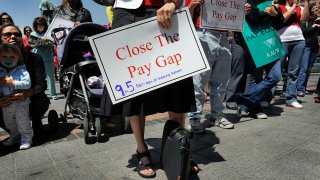
- In the last year, women have lost the majority of jobs, dropped out of the labor force and are disproportionately represented in the industries most devastated by Covid-19.
- Today, a woman just starting out will earn $406,760 less over a 40-year career compared to men, according to a new analysis by the National Women’s Law Center.
- For Black women, this lifetime wage gap totals $964,400, and for Latina women, the losses are $1,163,920.
Wednesday is Equal Pay Day, a reminder of the persistent income inequality between men and women.
Currently, women earn just 82 cents for every dollar earned by men, according to an analysis of U.S. Census Bureau data by the National Women's Law Center.
Get Southern California news, weather forecasts and entertainment stories to your inbox. Sign up for NBC LA newsletters.
As a result, March 24 marks just how far into the new year full-time female workers have to keep working to make what their male counterparts typically made in just the previous year, also known as the gender pay gap. In other words, a woman has to work nearly 15 months to earn what a man makes in one year.
More from Invest in You:
Single moms are hit the hardest by the gender pay gap
Women are more financially stressed than ever
Advocates say more is needed to fix the child-care crisis
Although the discrepancy hasn't changed much in years, the coronavirus crisis closed the gap by about one cent.
Money Report
That's because lower paid women disproportionately lost their jobs in 2020, which drove up average pay, according to salary comparison site PayScale.
Women are also highly represented in occupations that have been particularly hard hit by Covid-19, including health care, education and food and service industries.
Further, many women voluntarily left the workforce to care for children now going to school remotely.

"We now see a rate of labor force participation that's the lowest since 1988," said Emily Martin, vice president for education and workplace justice at the National Women's Law Center.
"We've lost a generation of progress there."
"Gender inequities in the workforce are all the more dire today in light of the coronavirus pandemic," said Sarah Foster, an analyst at Bankrate.com.
"Women have endured disproportionately more job losses then men throughout the recession and are dropping out of the labor force at faster rates as service-sector jobs run dry and child-care needs impact their ability to work."
"Healing these scars will likely take years," she added.
Over time, the inequality is magnified. Based on today's wage gap, a woman just starting out will lose $406,280 over a 40-year career, according to an analysis by the National Women's Law Center.
The pay gap worsens significantly for Black and Latina women.
For Latina women, the lifetime wage gap totals more than $1.1 million, and for Black women, the losses are close: $964,400, the nonprofit advocacy group found.
"As millions of women lost their jobs in the past 12 months, gender and racial wage gaps robbed them of a financial cushion to weather this crisis," Martin said.

There are a few things the government can do, Martin added.
In January, House Democrats reintroduced the Paycheck Fairness Act, which aims to eliminate pay discrimination and strengthen workplace protections for women. The current configuration of the Senate increases the likelihood that the legislation could be passed during this Congress.
A $15 federal minimum wage would also go a long way toward boosting pay for working women — but it is looking less likely that a bill will get through Congress anytime soon.
SIGN UP: Money 101 is an 8-week learning course to financial freedom, delivered weekly to your inbox.
CHECK OUT: Here's the credit score you need to buy a home via Grow with Acorns+CNBC.
Disclosure: NBCUniversal and Comcast Ventures are investors in Acorns.






